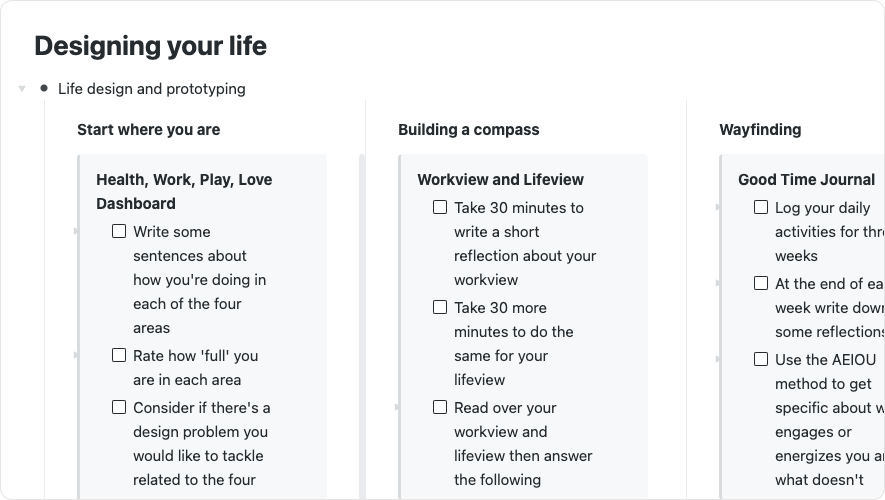Designing Your Good Life: A Practical Guide

Table of Contents
Defining Your Values and Goals
Understanding your core values is the cornerstone of designing a fulfilling life. What truly matters to you? What principles guide your decisions? Identifying your core values provides a compass to navigate life's choices and ensures your actions align with your deepest beliefs. This process of value alignment is crucial for long-term happiness and satisfaction. Without a clear understanding of your personal values, it's easy to get sidetracked by external pressures and lose sight of what truly matters.
-
Identify your top 5-10 core values: Consider values like family, creativity, health, learning, contribution, freedom, security, spirituality, adventure, or growth. Reflect on moments in your life where you felt most fulfilled; these often highlight your core values.
-
Brainstorm short-term and long-term goals aligned with these values: For example, if "family" is a core value, a short-term goal might be having a weekly family dinner, while a long-term goal could be building a strong family legacy. Ensure your goals are Specific, Measurable, Achievable, Relevant, and Time-bound (SMART).
-
Use visualization techniques to solidify your aspirations: Create a vision board, write in a journal, or simply spend time visualizing your ideal life. This helps solidify your goals in your mind and creates a powerful mental image to work towards. Consistent visualization is a key element of effective goal setting.
Mastering Your Time and Energy
Effective time and energy management is crucial for achieving your goals and preventing burnout. Learning to prioritize tasks, eliminate time-wasters, and recharge your batteries is essential for maintaining a healthy work-life balance and preventing stress. This isn't about squeezing more into your day; it's about maximizing your productivity and minimizing wasted energy.
-
Implement a time-blocking schedule: Allocate specific time slots for particular tasks or activities. This promotes focus and helps you stay on track. Experiment with different time management techniques like the Pomodoro Technique to find what works best for you.
-
Learn to say "no" to non-essential commitments: Protect your time and energy by politely declining requests that don't align with your goals or priorities. Saying "no" empowers you to focus on what truly matters.
-
Practice mindfulness and self-care to manage stress levels: Incorporate regular mindfulness practices, such as meditation or yoga, to reduce stress and improve focus. Prioritize self-care activities that help you recharge, such as spending time in nature, pursuing hobbies, or getting sufficient sleep.
-
Delegate tasks whenever possible: Don't try to do everything yourself. Delegate tasks to others where appropriate, freeing up your time and energy for higher-priority activities. This is especially important for achieving better productivity.
Building Meaningful Relationships
Strong relationships contribute significantly to a good life. Nurturing your connections with family, friends, and community provides social support, emotional well-being, and a sense of belonging. Investing in your relationships is an investment in your overall happiness.
-
Schedule regular quality time with loved ones: Make time for meaningful interactions with your family and friends, free from distractions. Quality time strengthens bonds and fosters deeper connections.
-
Practice active listening and empathy: Truly listen to others, showing genuine interest and understanding. Empathy strengthens relationships and creates a sense of trust and support. Strong communication skills are vital for healthy relationships.
-
Join groups or communities that align with your interests: Connect with like-minded individuals who share your passions. This broadens your social circle and provides opportunities for social interaction and support.
-
Cultivate healthy communication skills: Learn to express your needs and feelings clearly and respectfully, while also being receptive to the perspectives of others. Open and honest communication is vital for maintaining strong relationships.
Cultivating Personal Growth and Learning
Continuous learning and personal development are key to staying engaged and fulfilled. Embracing new challenges and opportunities for growth keeps you mentally sharp, fosters resilience, and enhances your overall well-being. Personal growth is a lifelong journey, not a destination.
-
Set aside time for reading, learning new skills, or pursuing hobbies: Dedicate time each week to expand your knowledge, learn new skills, or engage in activities that bring you joy and satisfaction. This fuels personal growth and enriches your life.
-
Take online courses or workshops: Explore online learning platforms to enhance your skills or explore new interests. This is a cost-effective and convenient way to pursue continuous learning.
-
Seek out mentors or role models: Learn from the experiences and wisdom of others who have achieved success in areas you aspire to. Mentorship provides valuable guidance and support on your personal growth journey.
-
Embrace challenges as opportunities for growth: View challenges not as setbacks but as opportunities to learn, grow, and develop resilience. This mindset fosters personal growth and builds character.
Financial Well-being and Security
Financial stability provides freedom and reduces stress, allowing you to pursue your goals with greater ease. While money isn't everything, financial security provides a foundation for a more fulfilling life. Effective financial planning is essential for achieving long-term financial well-being.
-
Create a budget and track your spending: Understand where your money is going and identify areas where you can reduce expenses. Budgeting is crucial for financial control and long-term financial success.
-
Pay off debt strategically: Develop a plan to pay off high-interest debt as quickly as possible. Debt management is key to improving your financial health.
-
Invest in your future: Start investing early to build wealth over time. Investing is crucial for long-term financial security and achieving financial freedom.
-
Plan for retirement: Begin planning for your retirement early to ensure you have sufficient funds to support yourself in your later years. Retirement planning is vital for financial security in your later life.
Conclusion
Designing your good life is an ongoing journey, not a destination. By actively defining your values, managing your time and energy effectively, nurturing meaningful relationships, and prioritizing personal growth and financial well-being, you can create a life that is truly fulfilling and meaningful. Remember, you have the power to shape your future – start Designing Your Good Life today! Take the first step toward creating the life you’ve always dreamed of by identifying your core values and setting your goals. Don't wait – start designing your good life now!

Featured Posts
-
 Banksy Art Prints A 22 7 Million Market Boom
May 31, 2025
Banksy Art Prints A 22 7 Million Market Boom
May 31, 2025 -
 Indian Wells 2024 Top Seed Zverevs First Round Defeat
May 31, 2025
Indian Wells 2024 Top Seed Zverevs First Round Defeat
May 31, 2025 -
 Canadian Wildfires A Public Health Emergency For Minnesota
May 31, 2025
Canadian Wildfires A Public Health Emergency For Minnesota
May 31, 2025 -
 Are Veterinary Watchdog Complaints As Bad As They Seem
May 31, 2025
Are Veterinary Watchdog Complaints As Bad As They Seem
May 31, 2025 -
 Munguia Denies Doping Claims Following Positive Test
May 31, 2025
Munguia Denies Doping Claims Following Positive Test
May 31, 2025
